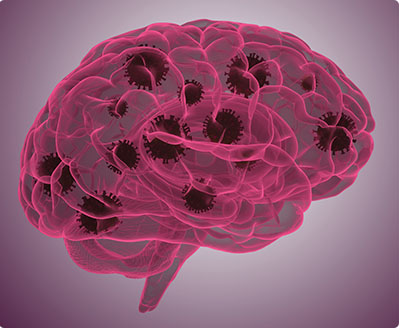
Your Gift Can Make 2x the Impact
Your Gift Can Make 2x the Impact
A gift can go twice as far during our February $100,000 2x Match. Your contribution by Feb. 27 will fuel Alzheimer’s research and help provide essential care and support.
Donate NowCOVID-19 May Damage the Brain in Older Adults
Virus Can Accelerate Alzheimer’s Symptoms
New research shows the virus could impact cognition, even accelerate Alzheimer’s symptoms
 While COVID-19 is notorious for wreaking havoc on the body, new research shows it could also impact the brain.
While COVID-19 is notorious for wreaking havoc on the body, new research shows it could also impact the brain.Studies presented at the Alzheimer’s Association International Conference® 2021 (AAIC®) in July found links between COVID-19 and persistent cognitive deficits, including the acceleration of Alzheimer’s-related brain changes and symptoms.
Many people who contract the SARS-CoV-2 coronavirus (the virus that causes COVID-19) experience short- and long-term symptoms, such as loss of smell and taste, and even experience cognitive and attention deficits known as “brain fog.” For some, these neurological symptoms persist even after they recover. Researchers are working to understand why this brain dysfunction occurs, and what it may mean for long-term cognitive health.
“These new data point to disturbing trends showing COVID-19 infections leading to lasting cognitive impairment and even Alzheimer’s symptoms,” says Heather M. Snyder, Ph.D., Alzheimer’s Association vice president of Medical and Scientific Relations. “COVID-19 has devastated the entire world. It is imperative that we continue to study what this virus is doing to our body and brain.”
These are the first findings to come out of an international, multidisciplinary consortium that is evaluating the long-term impact of the virus on the brain. The SARS-CoV-2 consortium includes scientific leaders from the Alzheimer’s Association and study teams from nearly 40 countries, with technical guidance from the World Health Organization.
A growing connection
 A SARS-CoV-2 consortium study conducted by researchers at the University of Texas Health Science Center at San Antonio and presented at AAIC found that recovered COVID-19 patients who still had a loss of smell also showed evidence of cognitive impairment in the brain.
A SARS-CoV-2 consortium study conducted by researchers at the University of Texas Health Science Center at San Antonio and presented at AAIC found that recovered COVID-19 patients who still had a loss of smell also showed evidence of cognitive impairment in the brain.In the study, 300 older adults from Argentina were examined three to six months after recovery. More than half showed persistent problems with forgetfulness, and roughly 1 in 4 had additional problems with cognition, such as issues with language and decision-making. These difficulties were associated with a lingering loss of smell.
“We’re starting to see clear connections between COVID-19 and problems with cognition months after infection,” says Gabriel de Erausquin, M.D., Ph.D., MSc, a University of Texas Health Science Center at San Antonio researcher who led the study.
“It’s imperative we continue to study this population, and others around the world, for a longer period of time to further understand the long-term neurological impacts of COVID-19.”
Acceleration of Alzheimer's-related symptoms
Additional research presented at AAIC found that COVID-19 infection was associated with an increase in biomarkers in the blood that indicate brain injury, neuroinflammation and biological changes associated with Alzheimer’s. Biomarkers are measurable biological changes that can show if a disease is present or a person is at risk.Researchers at New York University (NYU) took blood samples from 310 patients who were hospitalized for COVID-19. The blood samples revealed an increased presence of biomarkers for brain injury, neuroinflammation and Alzheimer’s in the patients who experienced COVID-19-related neurological issues.
COVID-19, Alzheimer's and dementia
We offer 24/7 support, resources and tips about COVID-19 for people living with dementia, caregivers and families. During these difficult times and always, you’re not alone in the fight against Alzheimer’s.
Brain deprived of oxygen
Another SARS-CoV-2 consortium study conducted by researchers at the University of Thessaly in Greece showed that individuals experiencing cognitive decline after recovering from COVID-19 infection were more likely to have low blood oxygen saturation as well as poor overall physical condition.“A brain deprived of oxygen is not healthy, and persistent deprivation may very well contribute to cognitive difficulties,” says George Vavougios, M.D., Ph.D., a researcher from the University of Thessaly who co-led the study.
Long-term impact of viruses
The impact of viral infections on the brain and their relationship to cognitive decline and Alzheimer’s has long been debated by researchers. To date, scientists have not been able to prove that a virus can cause Alzheimer’s disease or Alzheimer’s symptoms in the brain. But the latest research on COVID-19 is providing more clues on just how viruses can impact a person’s ability to think and remember, both in the short term while sick and long after they recover from an infection.Just because you get COVID-19 doesn’t mean you are destined to develop dementia, Snyder notes. “We are still trying to understand this relationship and will need to continue to study COVID-19 for many, many years to come,” Snyder says.
